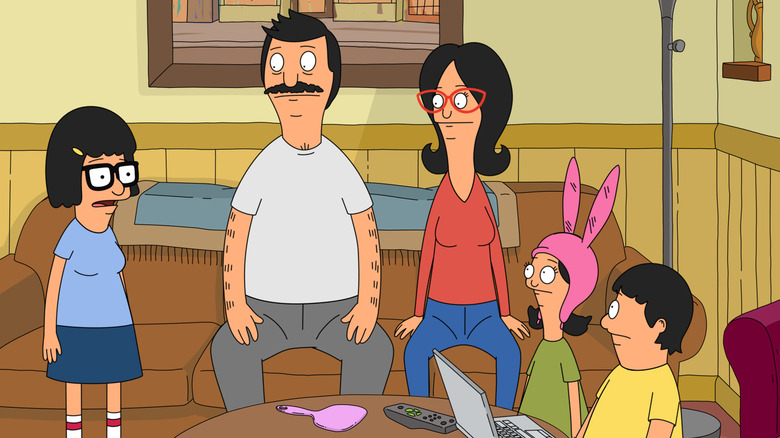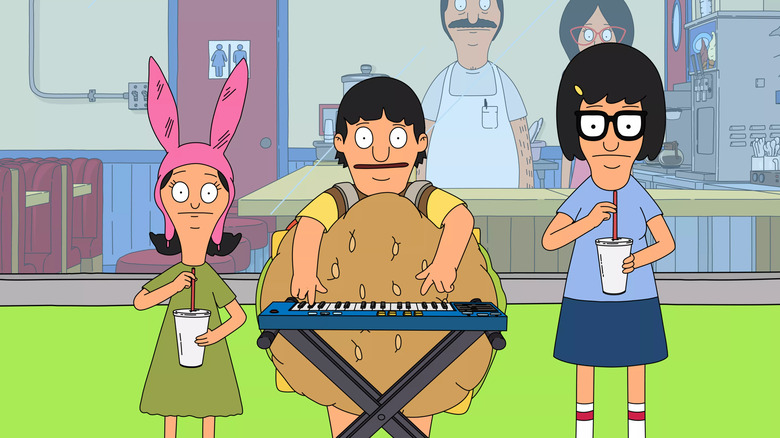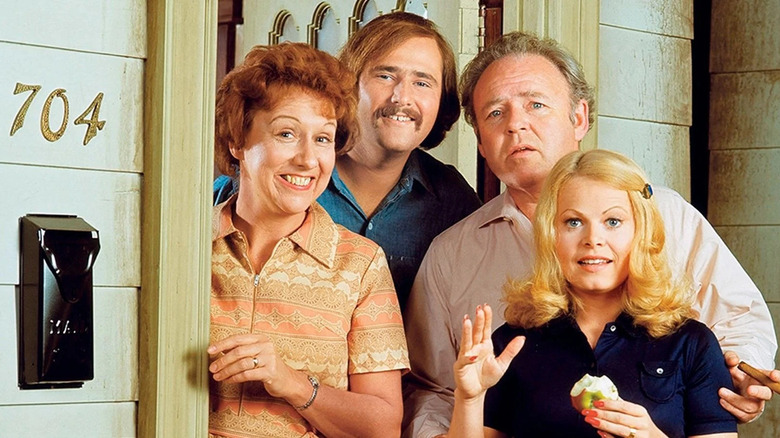How Bob's Burgers Sidestepped A Classic Sitcom Blunder
Loren Bouchard's and Bernard Derriman's "The Bob's Burgers Movie," out in theaters at the end of May, will nestle neatly between the show's 12th and 13th seasons. The long-running animated sitcom has slyly entrenched itself in the American pop consciousness as this generation's "yeah, I could watch that" show. The Belcher family is a gathering of kooks and obsessives whose bizarre interests set them apart from even other kooks. No one character is exactly on any other's wavelength on "Bob's Burgers." Bob (H. Jon Benjamin) is obsessed with his diner, but he doesn't really seem to understand humanity. His wife, Linda (John Roberts), is enthused and encouraging to the point of near-madness. Their daughter Tina (Dan Mintz) is just as horny as she is laconic. Their son, Gene (Eugene Mirman), is the Platonic ideal of a lovable, clueless goober. And the youngest, Louise (Kristen Schaal), never seen without her pink bunny ears, possesses agency and mental clarity beyond the rest of her family.
While the characters don't necessarily "get" each other, the central joke of "Bob's Burgers" is they openly embrace one another. Is Eugene wearing a sasquatch mask this week? That's Eugene for you. Is Tina quietly obsessing about butts? That's what Tina does. There is an underlying affection the Belchers have for one another that keeps audiences coming back. They may annoy each other, and they may often bicker or even scream at one another, but the Belchers provide for one another something no one else does: complete, unconditional acceptance.
In a 2014 interview with NPR, show creator Bouchard explained how that acceptance was achieved, and how it involved a deliberate rejection of a very specific classic sitcom character.
The Archie Bunker urge
In the NPR interview, Loren Bouchard talked about the cultural rejection of Archie Bunker. Archie Bunker was, for some younger readers, the lead character on the 1971 sitcom "All in the Family." Played by Carroll O' Connor, Archie was an angry, disconnected bigot. A World War II veteran and working-class stiff, Bunker would frequently rave about how the world used to be better, and how modern progress is harming the "old way." The theme song was called "Those Were the Days." He has become a symbol — another Platonic ideal — of the average American conservative. And because too much personal growth would undo Archie Bunker as a comedic construct, the writers of "All in the Family" were careful to keep him at least mildly bigoted and most certainly suspicious of progressive thinking in even his closest family members. Much of the comedy on the show stemmed from Archie's unwillingness to understand other people. It was a screenwriting shortcut: conflict = story.
Archie Bunker's "grumpy dad" character became an archetype for decades, and one can still see similar characters on sitcoms today. Bouchard wanted the coldness of Bunker to be actively jettisoned from his show. He told NPR:
"There's a sort of what I call the 'Archie Bunker urge' in creating your characters. And ... I can see it as a trap, that you might want to, say, make your dad character intolerant, and then you could say, 'Well, the son's coming out — he's gay, isn't that going to be funny? They don't understand each other!'
The conflict comes from elsewhere
Christopher Booker's 2004 book "The Seven Basic Plots: Why We Tell Stories" condensed all human storytelling — to the author's eye — to just seven stories told over and over in slightly different forms. Booker looked deep into history and to psychiatrist Carl Jung for his theories. While often (very) reductive, these kinds of books are handy for modern screenwriters to maintain focus. Is the central conflict of your script one of the seven basic plots? Is there conflict? Is the conflict between a man and himself? Is it between two characters? Is it between a person and the outside world? "All in the Family" was often the second of those. Loren Bouchard wanted it to be the third 100% of the time. He continued to NPR:
"But, for us — all of us working on the show, I think it ends up being more funny to just assume that they accept each other, the members of this family, and that the conflict comes from elsewhere, something more circumstantial. You know, 'Linda wants to go to a thing and Bob doesn't want to go' is funnier to me than 'one character doesn't fundamentally understand another character.'"
The warmth in "Bob's Burgers" has lead to 12 seasons of TV and a feature film. Although, to be fair, "All in the Family" lasted for nine seasons, and its spinoff, "Archie Bunker's Place," lasted for four.
"The Bob's Burgers Movie" opens on May 27, 2022.


